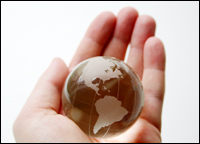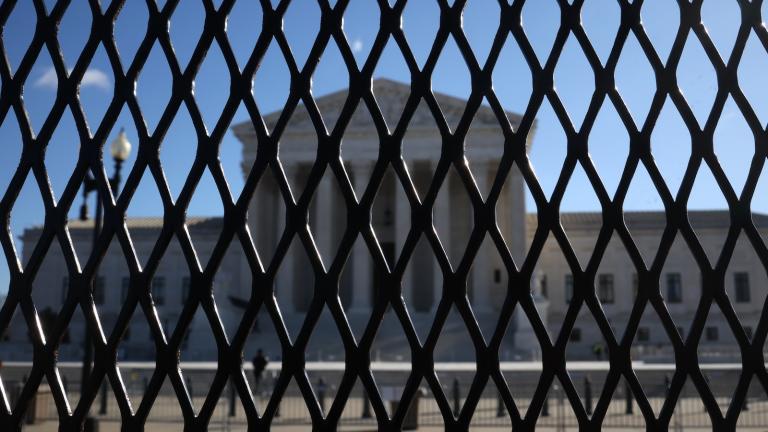The much-discussed Kyoto Protocol takes effect today, Feb. 16. In the face of the United States’ continuing refusal to ratify the international agreement, a group of progressive activists is launching a drive to gather millions of signatures from U.S. citizens for a “People’s Ratification of the Kyoto Global Warming Treaty.” Ross Gelbspan, a Grist contributor and author of two books on climate change — The Heat Is On and Boiling Point — explains why you should put your coffee mug down and sign the petition today.
What on earth is a person supposed to do?
History and nature are on a collision course. And we are trapped at ground zero.

The future of the world’s climate is in your hands.
As the signals from the climate become excruciatingly urgent, the Bush administration turns its back on the challenge, the U.S. press remains in denial, and the environmental establishment agonizes over its own relevance. All the while, we are, as the British paper The Independent put it, sleepwalking into the Apocalypse.
What on earth is a person supposed to do?
The existential choices are few and barren. We can try to find a safe haven in, say, New Zealand — but there’s no escaping a global threat. We can defy a history of futility and try, yet again, to appeal to the humanitarian instincts of ExxonMobil and Peabody Energy. We can go into hibernation for four more years. Or we can try, as individuals and organizations, to bring the U.S. in line with the rest of the world.
That’s what a small group is attempting with today’s launch of a nationwide signature-gathering drive for a People’s Ratification of the Kyoto Global Warming Treaty. Last year, longtime New York-area activists Ted Glick, Connie Hogarth, and the Rev. Paul Mayer put together the Climate Crisis Coalition, an umbrella group that includes environmentalists, religious leaders, campus organizers, peace groups, and activists working on indigenous rights, environmental justice, and human-rights issues. (I am an honorary member of the CCC.)
Drawing on the anti-Vietnam War movement, the Nuclear Freeze movement of the early 1980s, and the more recent — and stunningly successful — campaign to ban landmines, the CCC hopes to provide powerful testimony that millions of Americans are far ahead of their government in standing up to what is arguably the greatest challenge ever to face humanity. “We … recognize that the Constitution of the United States grants us the ultimate authority of government,” reads the petition in part, continuing, “we hereby ratify the Kyoto Protocol and demand that our elected representatives follow suit.”
While acknowledging that the current goals and timetable of the protocol are inadequate, the coalition is pledging its support for future rounds of the agreement, which could reduce emissions by as much as 70 percent.
It may be a long shot. But it’s the best shot we’ve got.
Feeling the Heat
In late January, Rajendra Pachauri, chair of the Intergovernmental Panel on Climate Change, declared that the world has “already reached the level of dangerous concentrations of carbon dioxide in the atmosphere” and called for immediate and “very deep” cuts in emissions if humanity is to survive.
Pachauri’s declaration came alongside new findings unveiled on Jan. 24 by a commission of scientists from the U.S., the U.K., and Australia, which declared that the world is about 10 years — or about 2 degrees Fahrenheit — away from irreversible climate change. The scientists calculated that the “point of no return” will arrive when concentrations of atmospheric carbon dioxide reach 400 parts per million (ppm). For most of the 20th century, these carbon concentrations increased by about 1 ppm per year. In recent decades, that rate rose to 1.5. Today it’s more than 2 ppm per year. Grand total: 379 ppm, and counting. It’s a level of atmospheric carbon this planet has not experienced for 420,000 years.
As if on cue, about a week later, researchers with the British Antarctic Survey reported that the massive West Antarctic ice sheet may already have begun to collapse. Citing recently discovered increased glacial flows into the Antarctic Ocean, Chris Rapley, head of the survey, noted: “The last IPCC report characterized Antarctica as a slumbering giant in terms of climate change. I would say it is now an awakened giant.”
Also in late January, Britain’s Hadley Center for Climate Prediction and Research released giant computer models created by the combined power of more than 95,000 computers in 150 countries. The models dramatically increased the estimate of future warming from between 4 and 10 degrees Fahrenheit to as much as 20 degrees Fahrenheit. “The danger zone is not something we are going to reach in the middle of this century,” said the center’s Myles Allen. “We are in it now.”
Adding to the grim picture, a recent Christian Science Monitor article noted that the 850 new coal-fired power plants that India, China, and the U.S. are planning to build would generate up to five times more carbon dioxide than would have been avoided by the Kyoto Protocol.
What on earth is a person supposed to do?
Meanwhile, several leading environmental groups in the U.S., which pushed so hard to get the Clinton administration to adopt the Kyoto Protocol, have put the issue of American ratification on the back burner. Instead, they are focusing on domestic actions to prepare for what they hope will be the eventual reentry of the U.S. into climate negotiations.
By contrast, the CCC, driven by the urgency of the situation, wants to generate popular support now for the 141 nations that have ratified or accepted the protocol and that plan to ramp up the treaty’s goals in the next round of talks, perhaps by as much as 400 percent.
With support from Global Exchange, Greenpeace USA, and Rainforest Action Network, petition organizers believe that, given the current political climate, the time is right for this kind of grassroots initiative.
The Bush administration’s intent to undermine Kyoto became crushingly clear, yet again, two months ago in Buenos Aires, when it neutered the next round of talks planned for this coming May. The talks had been intended to focus on much larger and more rapid emissions-cutting goals, but as a result of U.S. intransigence, they have been reduced to a mere informational seminar, which prohibits the mention of any action plan whatsoever.
The U.S. action left the Kyoto talks not even a “foothold,” according to Michael Zammit Cutajar, former executive secretary of the U.N. Framework Convention on Climate Change. “It’s a finger-hold, like hanging on by your nails.”
What on earth is a person supposed to do?
Sign this petition. Prove what CCC believes — that, despite the media’s criminal negligence of the climate crisis, you know about it, and you care. And that there is an untapped reservoir of receptivity among the general public, if only because so many people have been so startled by changes in the weather that they know intuitively something is terribly wrong.
Even before its official launch, the petition gathered some impressive signatures. Renowned environmental leaders Lester Brown and Barry Commoner have signed on. So have writer Bill McKibben and Michael Shellenberger, cofounder of the Apollo Alliance and coauthor of “The Death of Environmentalism.” [Editor’s note: McKibben is a member of Grist‘s board of directors.] Others include Rep. Dennis Kucinich (D-Ohio), singer and songwriter Pete Seeger, actor Edward Asner, and prominent religious leaders such as Bishop Thomas J. Gumbleton of Detroit. The petition has garnered support from Energy Action, the Green House Network, the Just Transition Alliance, KyotoUSA, the Alliance for Affordable Energy, MADRE, the Green Energy Network, New York Climate Rescue, the cosmetics company Aveda, and others.
With today’s debut, the members of the CCC stress that their campaign reflects values that transcend the goal of reducing carbon emissions. In its final paragraph, the petition declares that the very act of signing affirms “our allegiance to the democratic process, our fundamental and mortal relationship with this Earth, and our essential solidarity with every other member of the human family.”
Stand up and be counted.
What else on earth is a person supposed to do?
People’s Ratification of the Kyoto Global Warming Treaty
When faced with a grave threat to a livable future for ourselves, our children, and future generations, it is our duty as Americans to respond.
To date, some 141 nations have ratified the Kyoto Protocol, which enters into force in February 2005, in order to arrest the intensifying destructiveness of global climate change.
In contrast, the United States, which generates 25 percent of the world’s polluting carbon emissions with only 5 percent of its population, refuses to join in this worldwide effort to keep this planet hospitable to civilization.
We recognize the current goals of the Protocol are too low — and its timetable too long — to effectively halt the escalating instability of the global climate.
We also recognize the Kyoto Protocol is the only existing diplomatic framework through which the entire global community can address this unprecedented challenge.
We further recognize that the Constitution of the United States grants us the ultimate authority of government.
Therefore, as citizens of the United States, we hereby ratify the Kyoto Protocol and demand that our elected representatives follow suit.
Additionally, we pledge to support subsequent phases of the Kyoto Protocol to reduce worldwide greenhouse-gas emissions by 70 percent. This global transition to clean energy would address nature’s demand for a stable climate even as it generates millions of clean-energy jobs.
Finally, we declare, through this act of ratification, our allegiance to the democratic process, our fundamental and mortal relationship with this Earth, and our essential solidarity with every other member of the human family.
To sign this petition, click here.



